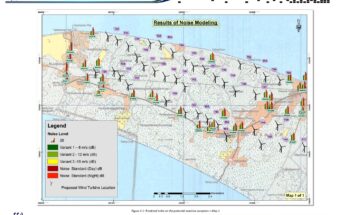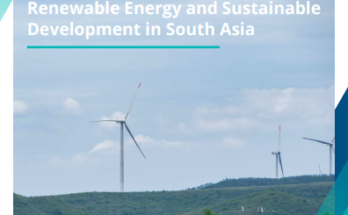On 28th February 2022, Intergovernmental Panel on Climate Change (IPCC) released their latest report on Climate Change. The report predicts the unavoidable multiple climate hazards over the next two decades with global warming of 1.5°C (2.7°F). The report themed Climate Change 2022: Impacts, Adaptation and Vulnerability is the Working Group II contribution to the IPCC Sixth Assessment Report which assesses the impacts of climate change, looking at ecosystems, biodiversity, and human communities at global and regional levels. It also reviews vulnerabilities and the capacities and limits of the natural world and human societies to adapt to climate change.

(including their biodiversity) and human society. (Source – IPCC AR6 WGII Summary For Policymakers)
This report summarizes the current understanding of observed climate change impacts on ecosystems, human societies and their cities, settlements, infrastructures and industrial systems as well as vulnerabilities and future risks tied to different socioeconomic development pathways. The report is set against a current backdrop of rapid urbanisation, biodiversity loss, a growing and dynamic global human population, significant inequality and demands for social justice, rapid technological change, continuing poverty, land degradation and food insecurity, and risks from shocks such as pandemics and increasingly intense extreme events from ongoing climate change. The report also assesses existing adaptations and their feasibility and limits. Any success of adaptation is dependent on the achieved level of mitigation and the transformation to global and regional sustainability outlined in the Sustainable Development Goals (SDGs). Accordingly, adaptation is essential for climate-resilient development. Compared to earlier IPCC assessments, this report integrates more strongly across the natural, social and economic sciences, highlighting the role of social justice and diverse forms of knowledge, such as Indigenous knowledge and local knowledge, and reflects the increasing importance of urgent and immediate action to address climate risk.
“This report is a dire warning about the consequences of inaction,” said Hoesung Lee, Chair of the IPCC. “It shows that climate change is a grave and mounting threat to our wellbeing and a healthy planet. Our actions today will shape how people adapt and nature responds to increasing climate risks.”
Urgent action required to deal with increasing risks
Increased heatwaves, droughts and floods are already exceeding plants’ and animals’ tolerance thresholds, driving mass mortalities in species such as trees and corals. These weather extremes are occurring simultaneously, causing cascading impacts that are increasingly difficult to manage. They have exposed millions of people to acute food and water insecurity, especially in Africa, Asia, Central and South America, on Small Islands and in the Arctic.
To avoid mounting loss of life, biodiversity and infrastructure, ambitious, accelerated action is required to adapt to climate change, at the same time as making rapid, deep cuts in greenhouse gas emissions. So far, progress on adaptation is uneven and there are increasing gaps between action taken and what is needed to deal with the increasing risks, the new report finds. These gaps are largest among lower-income populations.
The Working Group II report is the second instalment of the IPCC’s Sixth Assessment Report (AR6), which will be completed this year.
“This report recognizes the interdependence of climate, biodiversity and people and integrates natural, social and economic sciences more strongly than earlier IPCC assessments,” said Hoesung Lee. “It emphasizes the urgency of immediate and more ambitious action to address climate risks. Half measures are no longer an option.”
Safeguarding and strengthening nature is key to securing a liveable future
There are options to adapt to a changing climate. This report provides new insights into nature’s potential not only to reduce climate risks but also to improve people’s lives.
“Healthy ecosystems are more resilient to climate change and provide life-critical services such as food and clean water”, said IPCC Working Group II Co-Chair Hans-Otto Pörtner. “By restoring degraded ecosystems and effectively and equitably conserving 30 to 50 per cent of Earth’s land, freshwater and ocean habitats, society can benefit from nature’s capacity to absorb and store carbon, and we can accelerate progress towards sustainable development, but adequate finance and political support are essential.”
Scientists point out that climate change interacts with global trends such as unsustainable use of natural resources, growing urbanization, social inequalities, losses and damages from extreme events and a pandemic, jeopardizing future development.
“Our assessment clearly shows that tackling all these different challenges involves everyone – governments, the private sector, civil society – working together to prioritize risk reduction, as well as equity and justice, in decision-making and investment,” said IPCC Working Group II Co-Chair Debra Roberts.
“In this way, different interests, values and world views can be reconciled. By bringing together scientific and technological know-how as well as Indigenous and local knowledge, solutions will be more effective. Failure to achieve climate resilient and sustainable development will result in a sub-optimal future for people and nature.”
Cities: Hotspots of impacts and risks, but also a crucial part of the solution
This report provides a detailed assessment of climate change impacts, risks and adaptation in cities, where more than half the world’s population lives. People’s health, lives and livelihoods, as well as property and critical infrastructure, including energy and transportation systems, are being increasingly adversely affected by hazards from heatwaves, storms, drought and flooding as well as slow-onset changes, including sea level rise.


“Together, growing urbanization and climate change create complex risks, especially for those cities that already experience poorly planned urban growth, high levels of poverty and unemployment, and a lack of basic services,” Debra Roberts said.
“But cities also provide opportunities for climate action – green buildings, reliable supplies of clean water and renewable energy, and sustainable transport systems that connect urban and rural areas can all lead to a more inclusive, fairer society.”
There is increasing evidence of adaptation that has caused unintended consequences, for example destroying nature, putting peoples’ lives at risk or increasing greenhouse gas emissions. This can be avoided by involving everyone in planning, attention to equity and justice, and drawing on Indigenous and local knowledge.
A narrowing window for action
Climate change is a global challenge that requires local solutions and that’s why the Working Group II contribution to the IPCC’s Sixth Assessment Report (AR6) provides extensive regional information to enable Climate Resilient Development.
The report clearly states Climate Resilient Development is already challenging at current warming levels. It will become more limited if global warming exceeds 1.5°C (2.7°F). In some regions it will be impossible if global warming exceeds 2°C (3.6°F). This key finding underlines the urgency for climate action, focusing on equity and justice. Adequate funding, technology transfer, political commitment and partnership lead to more effective climate change adaptation and emissions reductions.
“The scientific evidence is unequivocal: climate change is a threat to human wellbeing and the health of the planet. Any further delay in concerted global action will miss a brief and rapidly closing window to secure a liveable future,” said Hans-Otto Pörtner.
An Eye Opener for Sri Lanka
Sri Lanka is facing the imminent adverse effects of global warming with the fast faced destruction of Sri Lankan environmental hotspots in the name of development. These devastation can already be seen in the form of agricultural, industrial, and residential developments.Thousands of acres around the country are being cleared of natural vegetation, natural waterways are being blocked to create reservoirs, and so many pollutants are being added to the natural ecosystems, creating favorable conditions for climate change. Even though Sri Lanka is a small island, it is home to areas with many different climatic conditions, and the country has been very lucky to have a weather pattern that has a unique bond with the agriculture-based living systems in the country. This delicate climatic conditions and weather patterns have shown a significant change that can be attributed to climate change, which has been accompanied by the destruction of the natural environment in and around the country.
But one of the most alarming facts is that neither the Sri Lankan people nor the policy makers seem to have any concern about climate change, so they seem to keep a blind eye towards the destruction happening around the island. The word “sustainable” seems like an alien term here in Sri Lanka.
Featured Image –
A Borrowed Planet – Inherited from our ancestors. On loan from our children. by Alisa Singer, www.environmentalgraphiti.org Source: IPCC



